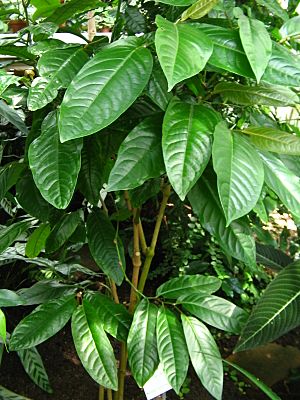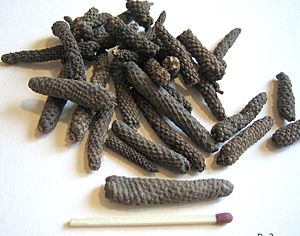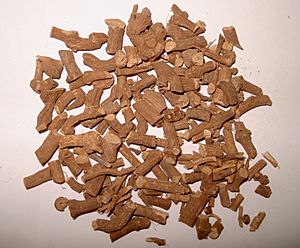Long pepper facts for kids
Quick facts for kids Long pepper |
|
|---|---|
 |
|
| Long pepper's leaves and fruit | |
| Scientific classification | |
| Kingdom: | |
| (unranked): | |
| (unranked): | |
| Order: | |
| Family: | |
| Genus: | |
| Species: |
P. longum
|
| Binomial name | |
| Piper longum |
|
Long pepper (Piper longum), sometimes called Indian long pepper or pipli, is a special kind of flowering plant. It's a vine that grows fruits. These fruits are usually dried and used as a spice to make food taste better. Long pepper tastes a bit like black pepper, but it's even hotter!
The fruit of the long pepper plant is made of many tiny fruits. Each one is super small, like a poppy seed. They are all stuck together on a flower spike, which looks a bit like a hazel tree catkin. Just like black pepper, long pepper fruits have something called piperine. This is what makes them spicy! Another type of long pepper, Piper retrofractum, grows in Java, Indonesia. People sometimes confuse long pepper fruits with chili peppers. Chili peppers belong to a different plant family called Capsicum, and they originally came from the Americas.
Contents
The History of Long Pepper
Ancient Uses of Long Pepper
The first known mentions of long pepper come from ancient Indian books. These books, part of a traditional medicine system called Ayurveda, describe how long pepper was used. They talk about its uses in both medicine and cooking. Long pepper arrived in Greece around 500 or 600 years before Christ. The famous doctor Hippocrates wrote about it as a medicine, not just a spice.
Long Pepper in Europe
For a long time, long pepper was a very important and well-known spice in ancient Greece and Rome. This was before Europeans found the American continents. People often mixed up the history of black pepper with long pepper. However, Theophrastus, a Greek scientist, was the first to tell them apart in his writings about plants. The Romans knew about both, but often just called them piper. Pliny, a Roman writer, even thought black pepper and long pepper came from the same plant by mistake.
Why Long Pepper Became Less Popular
Around the 1100s, black pepper started to become more popular in Europe than long pepper. By the 1300s, black pepper had mostly replaced it. The search for cheaper and easier ways to get black pepper led to the Age of Discoveries. This was a time when European explorers traveled the world. After the Americas were discovered, chili peppers were found. The Spanish called them pimiento, using their word for long pepper. Chili peppers were easier to grow in many places closer to Europe. Because of this, long pepper became much less popular. Today, it's quite rare to find long pepper in regular stores.
Where the Word "Pepper" Comes From
The word pepper actually comes from the word for long pepper, which is pippali. The long pepper plant first grew in India. Even the word pepper in bell pepper comes from the same origin. Bell peppers are completely different plants from the Capsicum family. People started using the word pepper for bell peppers in the 1500s.
How Long Pepper is Used Today
Today, long pepper is not often used in European cooking. But you can still find it in Indian and Nepalese vegetable pickles. It's also used in some North African spice mixes. You might find it in Indonesian and Malaysian cooking too.
You can usually buy long pepper at Indian grocery stores. It is often labeled as pippali. Pippali is a main spice in Nihari, which is a national dish of Pakistan. It's also popular in the Indian city of Lucknow.
See also
 In Spanish: Pimienta larga para niños
In Spanish: Pimienta larga para niños



